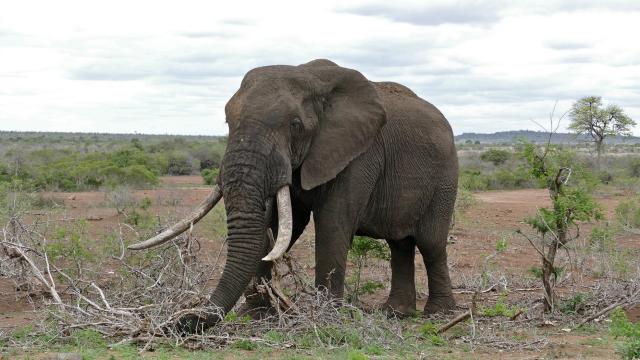Humans are at war. They’re at war with each other, they’re at war with themselves, and some are at war with elephants. Researchers want to know how humans and the long-snooted aggressors can live in peace.
Image: Bernard Dupont/Flickr
Northern Botswana is a hotspot in the ongoing human-elephant conflict, with 16,000 people trying to coexist with 11,000 elephants. As humans take up more and more space in the area to farm, the result has been crop-raids (elephants eating or damaging crops) and casualties on both sides. There are a few hundred elephant raids annually in Botswana alone, and hundreds of people have died worldwide from run-ins with elephants. So it’s understandably hard to convince the locals to protect the vulnerable African Elephant population when they keep raiding their farmland. But American and British scientists have realised it’s also difficult to predict and understand these complex interactions.
The researchers are primarily collecting data from government and non-government agencies in the area, on the humans, the elephants, and on how both groups use land. To protect both the people and the elephant, the researchers believe they need to survey the trends in the data to determine the causes of the conflict, and what factors make it worse. They also worked alongside local village chiefs to figure out the number of times elephants raided cropland in the area.
They found that the human population grew from around 2000 to over 17,000 from 1971 to 2015, but the rate of growth slowed down. Meanwhile, the elephant populations seemed to increase exponentially from 1990 to 2015, from almost 3000 to over 11,000. The amount of allocated farmland hasn’t increased by much over the same time period and has actually decreased in the past few years. Their findings surprised them, though: Despite the increased populations of both people and pachyderms, the number of raids has seemed to decrease in the past 10 years. And the models they built gave completely different predictions based on the amount of time they spanned.
All that made the researchers wonder what was actually causing the human-elephant conflicts if more inhabitants doesn’t mean more fighting. “Rather, it is the use of space and competition for resources between people and elephants that likely determines the level of conflict,” the researchers write in the study, published yesterday in PLOS One. That means that more farmland might mean more conflict, and reducing the number of crop raids might be as simple as more effective land use.
There are plenty of reasons to be sceptical of the findings. They’re based on a model, which built both estimates and a few different data sources, including self-reported data on an emotionally charged issue. There are so many factors that can go into whether or not elephants will raid farms, which is itself only one facet of the whole matter. Human-elephant conflict will continue to be an issue across the world — hundreds are killed annually by elephants in India as well. On top of that, Africa’s elephants, as well as their rhinos and other wildlife, already suffer from the poaching crisis. Also, who are we to go in there and think we can just fix everything?
The study is nonetheless useful, simply in the fact that it proves just how difficult predicting trends in human-elephant conflict might be. Fewer raids over time, despite more people and elephants in the region, did encourage the scientists. The researchers hope that conservationists will think carefully about their models before simply recommending decisions about managing elephant populations to lawmakers. Reimbursing people whose land has been raided by elephants might not get to the core of the problem, and might skew numbers in the wrong direction.
But hopefully one day we can learn to treat our trunked aggressors as friends.
[PLOS One]
